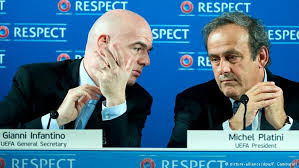When delegates from FIFA’s 209 member federations convene for their annual congress in Mexico later today, the man who wanted so much to be king will be conspicuous by his absence. Had the cards fallen differently, it would almost certainly have been Michel Platini and not Gianni Infantino taking centre stage in Mexico City at the start of the post-Sepp Blatter era.
No-one (perhaps apart from the man himself and maybe Blatter) will ever know for sure whether Platini’s breach of FIFA’s ethics code was simply an honest and unfortunate mistake or a calculated fraudulent move carried out under the assumption he would never get caught.
But the reaction to his four-year ban imposed by the Court of Arbitration for Sport demands a certain amount of scrutiny.
One of the first to respond was Infantino. One might have assumed, given the number of times he has pledged to clean up FIFA in recent weeks, that the new president would have endorsed CAS’s decision as an example of good governance. Had it been someone else and not Platini being judged, would Infantino, rather than express his sadness, have hailed the CAS verdict as another badly needed break with the old guard and condemned what many will regard as a blatant disregard for the normal rules of probity? Will he express the same remorse if and when Blatter, too, is sanctioned by CAS?
The hidden agenda, perhaps, is that Infantino was a reluctant FIFA president from the start despite his insistence, once Platini was ruled out, that he was his own man and the best person for the job. Perhaps he hoped to keep the seat warm so that his trusted former boss at UEFA could return to the fray in 2019.
That scenario, of course, has now been well and truly scuppered with a considerable knock-on effect as far as UEFA is concerned. Next Wednesday, UEFA’s top brass gather in Basel on the sidelines of the Europa League final to decide on a road map for Platini’s successor.
Quite possibly, they will go for a September election date at the same summit at which they will choose a female member of the new FIFA council. But are there any genuinely credible UEFA presidential candidates?
Just as Platini was touted as future FIFA boss, so Germany’s Wolfgang Niersbach was viewed in some quarters as his natural successor at UEFA. Not any more given how tainted he has become by the affair surrounding the bid process that led to Germany’s hosting of the 2006 World Cup. There is already a large of body of opinion which questions how and why Niersbach can possibly be hanging on in the corridors of power when he has had to resign the presidency of his own federation.
Then there is Angel Villar Llona, the veteran Spaniard who has been running the UEFA show as its senior vice-president in the weeks and months since Platini was first suspended. Even if he wants the job, Villar is so intrinsically linked with FIFA’s discredited old guard that UEFA’s 54 nations cannot possibly give it to him if they want to preserve any sense of dignity or forward-looking credibility.
The likeliest candidate would probably have been Infantino himself, stepping up from general secretary, but that of course is no longer an option. That leaves Dutch federation president Michael van Praag who for a time, remember, was in the frame to succeed Blatter before withdrawing from the race when it became clear his candidacy was muddying the waters. Strong-willed, experienced and with the requisite gravitas, van Praag, at 68, could perhaps see out Platini’s term until 2019, then hand over to someone younger.
In the short term, having taken the strategic decision not to formally appoint an interim president until Platini had exhausted all avenues to clear his name, UEFA find themselves in something of a pickle ahead of next month’s Euros in France but one of their own making. Hosting its showpiece event without a president (and without an established figurehead to hand over the trophy to the winners) is an embarrassment that could have been avoided had UEFA acted more quickly.
Platini’s strongest supporters would doubtless argue that they had a duty to rally round the man who has delivered many good things since taking charge in 2007. But there are those who take the opposite view, that UEFA’s procrastination has caused more problems than it has solved.
To be fair to Platini, unlike all the others who have joined FIFA’s rogues gallery over the past few months, he at least gloriously graced the game he ended up partly controlling.
But that is perhaps the real tragedy. Having been such an iconic figure in his playing days and then carrying the hopes of many as he rose to become European football’s leading administrator, courageously putting in place financial fair play and allowing more national champions to play in the Champions League, his legacy has now been irrevocably tarnished.
The sycophants within UEFA may be bemoaning the demise of their charismatic leader but according to some of those who worked close to Platini over the years, the Gallic charm, willing smile and outward all-for-one sense of rightousness belied a stubborness and dogmatism that ruffled more than a few feathers.
The sadness, if there is one, is not necessarily that Platini has been punished but that he will be unable to take pride of place at next month’s Euros in his homeland which will rekindle such potent memories of his own creative brilliance on the field of play.
Andrew Warshaw is chief correspondent of Insideworldfootball and was formerly Sports Editor of the European. Contact him at moc.l1745019186labto1745019186ofdlr1745019186owedi1745019186sni@w1745019186ahsra1745019186w.wer1745019186dna1745019186

